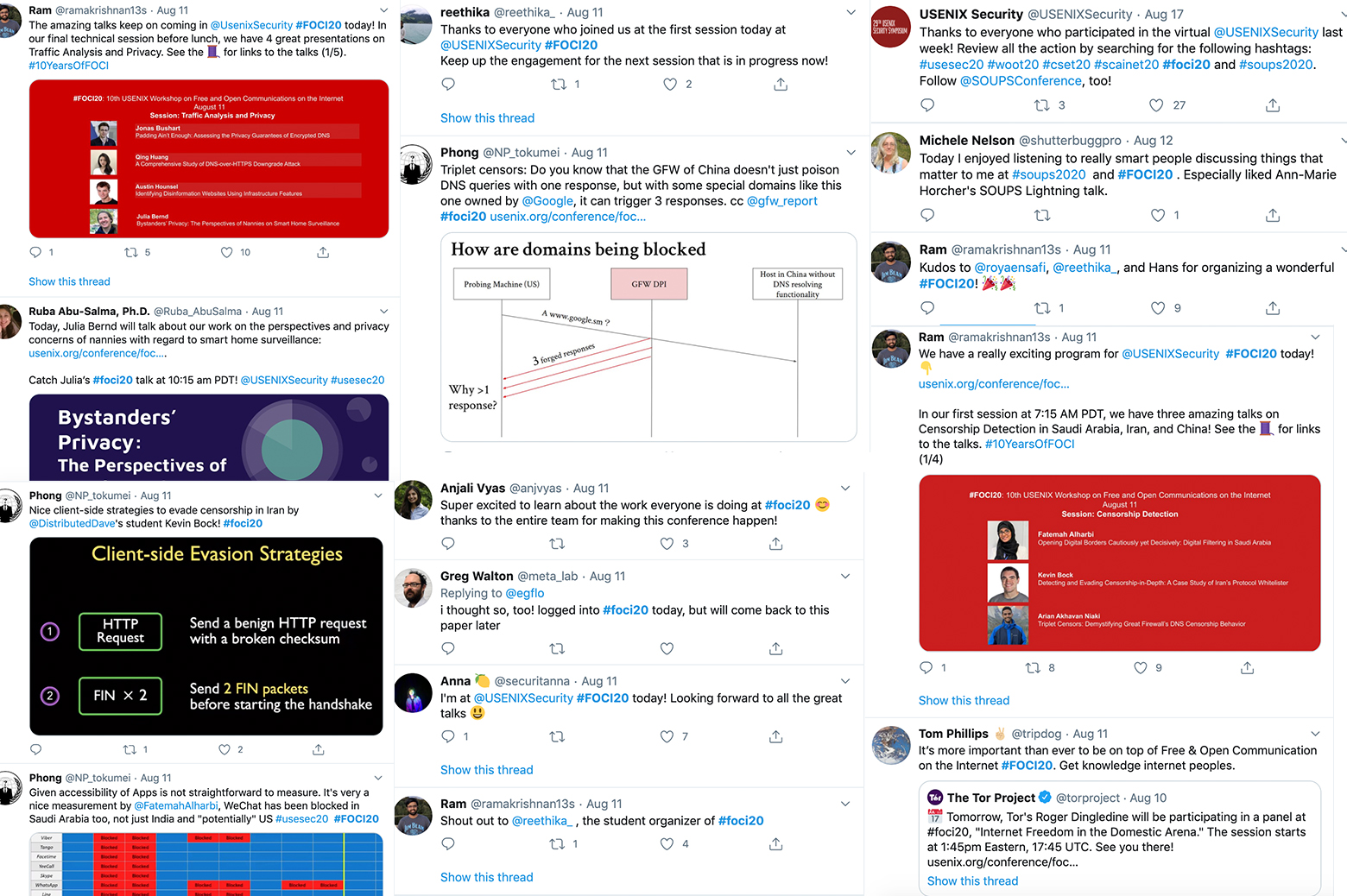CSE researchers help organize 10th anniversary workshop on internet freedom
Prof. Roya Ensafi and PhD candidate Reethika Ramesh led organizing efforts for USENIX’s Tenth Workshop on Free and Open Communications on the Internet.

 Enlarge
Enlarge
The biggest annual workshop for research on internet freedom celebrated its 10th anniversary this year, co-chaired by CSE Prof. Roya Ensafi with the help of CSE PhD candidate Reethika Ramesh, the student organizer. USENIX’s Workshop on Free and Open Communications on the Internet (FOCI) highlights efforts in computing and policy research to tackle censorship, surveillance, and privacy issues around the world.
For its 10th anniversary, Ensafi and fellow co-chair Hans Klein from the School of Public Policy at Georgia Institute of Technology made a number of operational changes to encourage broader participation and produce an engaging set of six interdisciplinary sessions including the traditional academic presentations and moderated panel sessions
“This year we changed the format of the workshop to be more community-driven and interdisciplinary,” says Ensafi. Students interested in presenting submitted a two-page proposal for review, and accepted projects were assigned a dedicated “shepherd,” an expert in the field, to help develop it into a full 6-pager by the end of the summer. The conference was packed with 11 full technical presentations, focused on topics from investigating censorship in Saudi Arabia, Iran, and China, to discovering new directions in evasion and studies conducting traffic analysis.
“This was such a cool way to run a workshop,” Asst. Professor of CS at the University of Maryland Dave Levin said on Twitter. “Folks submitted 2-pagers, and they were reviewed based largely on potential, and all accepts were conditional on the final, longer version meeting its promises. Reviewing was simple, shepherding creates connections; all around awesome!”
The program, a combination of technical sessions and panels, were well-attended, thanks to dedicated efforts to attract technical papers and panelists to discuss timely issues concerning free and open digital speech on the Internet. With participants from around the globe, remote attendance and the workshop’s digital setting also came as a blessing in disguise, says Ensafi.
“An unbelievable number of people attended the workshop,” she says, “It was very rewarding to see that each talk ended up with a lot of good questions.”
In addition to the 11 technical paper presentations, the program featured live debates revisiting the state of internet freedom and highlighting key issues facing the world today:
- Internet Freedom in the International Arena
Featuring:
Irene Poetranto, Senior Researcher, Citizen Lab, Munk School, University of Toronto
Hans Klein, Associate Professor, School of Public Policy, Georgia Tech
Bill Marczak, Senior Researcher, Citizen Lab, and Post-doctoral Researcher, University of California, Berkeley - Internet Freedom in the Domestic Arena
Featuring:
Nadine Strossen, Former President, American Civil Liberties Union, and John Marshall Harlan II Professor of Law, Emerita at New York Law School
Milton Mueller, Professor, School of Public Policy, Georgia Tech, and Director of the Internet Governance Project
Alex Halderman, Professor of Computer Science and Engineering, and Director of the Center for Computer Security & Society, University of Michigan
Roger Dingledine, Co-founder, Tor Project - US Internet Freedom Policies: Past, Present, and Future
Featuring:
Rebecca MacKinnon, Director, Ranking Digital Rights, New America
Max Hunter, Electronic Frontier Foundation
Hans Klein, Georgia Institute of Technology
FOCI is one of the few events catered to the internet freedom community, Ensafi says, and presents a key opportunity for the smaller research community to acknowledge good work and broaden collaboration.
“In many security communities there is a more competitive dynamic among the participants,” says Ensafi. “But what you realize being in the censorship community, the competition is between you and the impact you can make versus nation states or versus the authorities, whoever is hindering the flow of free information. This is the only workshop that brings all the interdisciplinary researchers from different backgrounds like law, policy, and CS together.”
This attitude drove the interdisciplinary focus emphasized by the event’s program committee.
“One of the key values of working on topics related to internet freedom is that, to have the right impact, you need to work in an interdisciplinary manner,” Ensafi continues. “You need to constantly ask questions about who is benefitting from your work, and ask if you’re making it accessible to the people who are actually going to use it. Are the people who are in the arena fighting this fight included in the progress and the path the research is taking?”
Co-chairing the event was of personal importance to Ensafi, who has attended eight of FOCI’s ten annual meetings over the course of her time as a researcher. Ramesh, pursuing her PhD in Ensafi’s lab, served as the event’s first student organizer, while others in the research group provided additional assistance promoting the talks and panels. The group, collectively responsible for the design and application of Censored Planet, were a key part of the workshop’s success, according to Ensafi.
“This kind of targeted small community gathering is very beneficial to ultimately doing impactful research,” says Ensafi. “All of the eight times I attended I met new people with different skills that opened my horizon to new types of research that I couldn’t think about solely as a computer scientist.”

 MENU
MENU 
